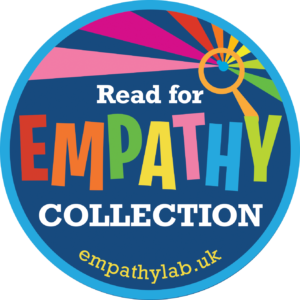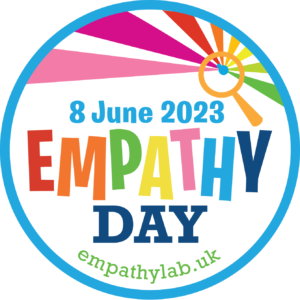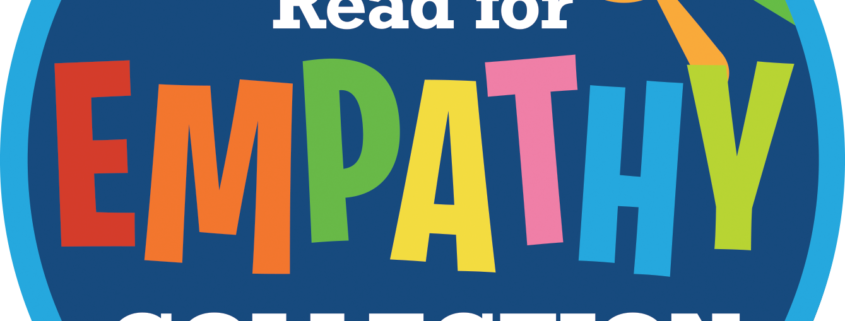Q&A with Empathy Lab Judges
On February 8, EmpathyLab announced its 2023 Read for Empathy Collection. Two lists of empathy laden books, one for primary and one for secondary. We wanted to learn more about how books get chosen and were thrilled to ask two judges a series of questions about the EmpathyLab collections. Thank you to Richard Charlesworth and Shaheen Mogradia for taking the time to answer our questions.

Richard Charlesworth is a Year 6 Class Teacher, Reading Lead and Assistant Head at Avonmore Primary School. He can usually be found tweeting about quality picture books and graphic novels at @rcharlesworth.

How did you get involved with EmpathyLab and the judging panel?
I have long been a supporter of EmpathyLab. I attended the first Empathy Conversation at Waterstones in Piccadilly, which was such an interesting and enlightening discussion. At the time, I was studying for a Masters in Children’s Literature at Goldsmiths. As part of one of my essays, I studied the link that empathy has with hybrid graphic novels. Following work within schools and training with EmpathyLab in Birmingham, I was invited to judge on the 2020 collection and have enjoyed being part of the process ever since.
Have your own empathy skills heightened since working with EmpathyLab?
When reading for the empathy collections, we focus on whether texts have key empathy angles, which include whether the texts offer readers an alternative point-of-view, challenge tribal thinking or tackle key issues of the day. In addition to many other angles, reading for empathy has ensured that I view texts with an increased criticality, through a lens which can best enable young readers to engage with characters, events and themes within a text.
How many books did you read for the judging process?
The judging process is split into two parts. The first section includes around 40-50 texts, which is read in teams. This then informs the longlist.
The longlist is usually around 120 titles, which is then read by everyone. Reading occurs around some of the school holidays – so there’s always a few texts that go on my travels with me!
Were there any books that didn’t make the list this year that you feel need to be highlighted?
There were a few titles that were hotly contested – however the process is very democratic. I don’t feel there are any major omissions, save one or two that might not have been available at the time of publication. We would love there to be more graphic novel submissions; they’re not only great at engaging all readers, they can convey so much through the interplay between words, image and gutters (gaps between panels).
How would you recommend schools and libraries use the lists and resources produced by EmpathyLab?
I’ve found having a section of the library (if schools are lucky to have one) or class book area, where empathy texts can be highlighted/celebrated, works well. Linking the collection to EmpathyLab’s motto of ‘Read. Connect. Act’ can facilitate greater agency and have a positive change in both readers’ attitudes and the wider school community.
Finally, the resources created around Empathy Day (this year held on Thursday 8th June), are great for engaging all children in the power of empathy and linking to high-quality texts that promote this key life skill.
Has being part of the panel changed how you read other books?
Although keeping pleasure at the heart of reading, I definitely have become more aware of the empathy angles when I’m reading any text. I am particularly interested in author research, authenticity and representation – something we consider deeply when discussing the read for empathy collection.
Shaheen Mogradia is Engagement and Programmes Assistant for Bolton Library and Museum Services

How did you get involved with EmpathyLab and the judging panel?
I was invited to join the Empathy Lab judging panel by Sarah Mears, after completing my Leading Libraries course through 2020/2021. I was then interviewed by founder, Miranda McKearney, who, it turns out, I had met when I was a teenager through The Reading Agency, so it was lovely to be reacquainted.
Was there anything that surprised you about the collection and making the choices?
As a new judge on the EmpathyLab team, I did not expect the amount of books that would be nominated for the Read for Empathy collection and I was surprised how quickly they came. Sometimes publishers would send books that weren’t on my list and before I knew it I was inundated with books, which (if you’re like me and you love books) is the best thing in the world! My years of reading had prepared me for this moment and, with my speedy reading glasses on, I got to work.
How many books did you read in order to make those important decisions?
The Read for Empathy judges are split into pairs and each pair is given a list of books to read before the deadline. Myself and the person I was paired with had a list of 43 books for Primary school aged children that we had to read. The idea is that we both read everything on our list and judge them on their empathy angle. This means the books are read and judged by at least 2 different people and are then discussed in the big meeting with all the EmpathyLab judges.
What is the criteria for adding books to the Read for Empathy collection?
EmpathyLab have very clear criteria for judging, any books submitted for the Read for Empathy collection must:
The judging criteria for the collection allow us to focus our attention on the empathy elements of the book as well as the overall quality. Our aim was to create a collection that reflects the needs of our children and communities which could be used by casual readers as well as professionals.
How would you recommend schools and libraries use these books and EmpathyLab resources?
EmpathyLab have a fantastic website! www.empathylab.uk. On the website you will find a whole range of brilliant resources to help you bring the empathy angle into your work. Empathy Lab offer training modules, CPDs and guidance on how to not only utilise the #ReadForEmpathy book collection to build empathy but much more!
In the past, I have used EmpathyLab’s resources to celebrate Empathy Day at the Library and Museum where I work; I have delivered a range of activities from story times, drawing sessions to using puppets in order to have empathy related conversations with our visitors.
See the full 2023 Read for Empathy collection and download FREE guides atwww.empathylab.uk/RFE-2023





